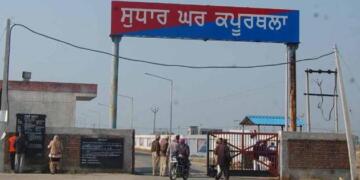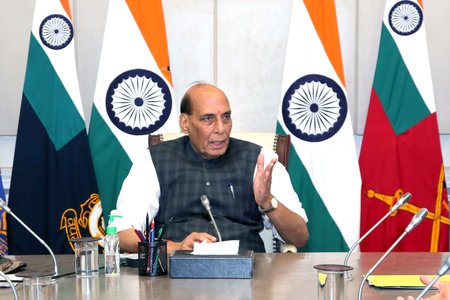Defence Minister Rajnath Singh is heading to China on Wednesday to present India’s vision for global peace and security, and to call for joint, consistent efforts to eliminate terrorism during the two-day SCO Summit in Qingdao, China.
“Today, 25th June, I shall be leaving for Qingdao, China, to take part in the Shanghai Cooperation Organisation (SCO) Defence Ministers’ Meeting. I will have the opportunity to interact with various Defence Ministers on a wide range of issues. Looking forward to present India’s vision for global peace and security and also, call for joint and consistent efforts to eliminate terrorism,” Rajnath Singh said in a post on X.
Defence Minister Rajnath Singh is leading a high-level delegation to the SCO Defence Ministers’ Meeting, set to begin today in Qingdao, China.
During the two-day session, defence leaders from SCO member states are expected to deliberate on regional and global security issues, strategies to combat terrorism, and avenues to boost cooperation among their military establishments.
Singh is likely to highlight India’s unwavering commitment to the SCO’s founding principles and stress the need for coordinated and consistent action against terrorism and extremism. He will also articulate India’s vision for peace, multilateralism, and regional stability.
On the sidelines of the summit, Singh is also expected to hold bilateral talks with his counterparts from key nations, including China and Russia—an engagement closely watched amid ongoing efforts to reset ties with Beijing.
This came after India-China relations took a step forward on Monday as National Security Adviser Ajit Doval met Chinese Foreign Minister Wang Yi in Beijing, with both sides reaffirming their commitment to de-escalating border tensions and improving bilateral ties after years of tension.
At SCO meet in China, NSA Doval calls for shunning double standards in fight against terrorism.
The Shanghai Cooperation Organisation, established in 2001, now comprises 10 member states: China, India, Kazakhstan, Kyrgyzstan, Pakistan, Russia, Tajikistan, Uzbekistan, Iran, and Belarus. India joined as a full member in 2017. China currently chairs the grouping under the 2025 theme, “Upholding the Shanghai Spirit: SCO on the Move.”
India continues to regard the SCO as a crucial platform for fostering regional security, economic integration, and people-to-people engagement, especially at a time of growing global and regional uncertainties.
The meeting, held on the sidelines of the Shanghai Cooperation Organisation (SCO) summit of national security officials, underscored the cautious but ongoing efforts by both countries to reset relations strained since the deadly 2020 Galwan Valley clash.
Wang noted that relations had seen signs of improvement and emphasised the need for sustained dialogue, mutual trust, and resolution of outstanding issues. “China and India should see each other as partners in development rather than strategic rivals,” Wang said, according to the Chinese foreign ministry. He called for both sides to demonstrate the maturity of two ancient civilisations by responsibly managing differences and preserving border stability.
Ajit Doval, meanwhile, reiterated India’s concern over cross-border terrorism and underlined the importance of joint efforts to combat it in all forms. His remarks come in the wake of the Pahalgam terror attack in Jammu and Kashmir in April in which 26 people were killed and reignited tensions between India and Pakistan. New Delhi blamed Pakistan-based groups for the assault, while Islamabad denied involvement. Pakistan further claimed its Chinese-supplied J-10C fighter jets were used during the brief conflict, drawing China into the spotlight, albeit indirectly.
Both sides reaffirmed their intent to promote wider bilateral engagement—including resumption of direct flights, easing of visa restrictions, and the revival of cultural and religious exchanges. On Friday, a group of Indian pilgrims entered Tibet for a 12-day journey to Mount Kailash and Lake Manasarovar, with another batch set to follow soon.
The meeting marked a follow-up to Doval’s earlier visit to Beijing in December 2024, where both sides agreed to rebuild trust after the sharp downturn caused by the eastern Ladakh standoff. That confrontation led to a deadly clash in the Galwan Valley in June 2020, followed by a protracted disengagement process that was formally concluded in October 2024 with the resolution of the final two friction points at Demchok and Depsang.























